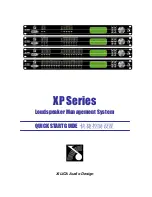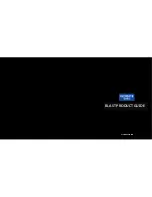
Thump12A • Thump15A P
o
w
er
ed Loudspe
ak
ers
12
Thump12A • Thump15A Powered Loudspeakers
Thump12A / Thump15A Loudspeakers: Rear Panel Features continued...
8. Main LED Switch / Limit LED
The LED on the front of the Thump loudspeaker
illuminates when this switch is disengaged and
AC power is available at the mains input. Engage
the switch if you do not want the front panel LED
to illuminate.
Thump loudspeakers have a built-in limiter that
helps to prevent the amplifier outputs from clipping
or overdriving the transducers. The limit indicator
illuminates amber when the limiter is activated.
It’s okay for it to blink yellow occasionally, but if it
blinks frequently or lights continuously, turn down
the gain knob(s) until it only blinks occasionally.
Excessive limiting may lead to overheating,
which in turn trips the thermal protect
circuitry and interrupts the performance.
See ‘Thermal Protection’ to the right for more
information.
Protection Circuitry
Thump loudspeakers employ a built-in limiter for
less distortion at peak levels. A dynamic bass response
circuit provides optimal low frequency response
regardless of overall output level. Additional protection
includes automatic thermal shutdown should the amp
overheat. However, with Class-D amp technology, which
is highly-efficient, this should never be a problem.
The protection circuits are designed to
protect the loudspeakers under reasonable
and sensible conditions. Should you choose
to ignore the warning signs [e.g. excessive distortion],
you can still damage the speaker in the loudspeaker
by overdriving it past the point of amplifier clipping.
Such damage is beyond the scope of the warranty.
Limiting
The driver has its own compression circuit which
helps protect it from damaging transient peaks.
The compressor is designed to be transparent and
is not noticeable under normal operating conditions.
Overexcursion Protection
A subsonic filter circuit just prior to the power
amplifier prevents ultra-low frequencies from being
amplified. Excessive low-frequency energy can damage
the woofer by causing it to “bottom out,” also know
as overexcursion, which is equivalent to a mechanical
form of clipping.
Thermal Protection
All amplifiers produce heat. Thump loudspeakers are
designed to be efficient both electrically and thermally.
In the unlikely event of the amplifier overheating, a
built-in thermal switch will activate, muting the signal.
When the amplifier has cooled down to a safe
operating temperature, the thermal switch resets
itself, and the Thump loudspeaker resumes normal
operation.
If the thermal switch activates, try turning down
the level control a notch or two on the mixing console
(or the back of the loudspeaker) to avoid overheating
the amplifier. Be aware that direct sunlight and/or
hot stage lights may be the culprit of an amplifier
overheating.
AC Power
Be sure the Thump loudspeaker is plugged into
an outlet that is able to supply the correct voltage
specified for your model. It will continue to operate
at lower voltages, but will not reach full power. Be sure
the electrical service can supply enough amperage for
all the components connected to it.
We recommend that a stiff (robust) supply of AC
power be used because the amplifiers place high
current demands on the AC line. The more power that
is available on the line, the louder the speakers will play
and the more peak output power will be available for
a cleaner, punchier bass. A suspected problem of “poor
bass performance” is often caused by a weak AC supply
to the amplifiers.
Never remove the ground pin on the power
cord or any other component of the Thump
loudspeaker. This is very dangerous.
Care and Maintenance
Your Thump loudspeakers will provide many years of
reliable service if you follow these guidelines:
• Avoid exposing the loudspeakers to moisture.
If they are set up outdoors, be sure they are
under cover if rain is expected.
• Avoid exposure to extreme cold (below
freezing temperatures). If you must operate
the loudspeakers in a cold environment, warm
up the voice coils slowly by sending a low-level
signal through them for about 15 minutes prior
to high-power operation.
• Use a dry cloth to clean the cabinets. Only do
this when the power is turned off. Avoid getting
moisture into any of the openings of the
cabinet, particularly where the drivers are
located.







































